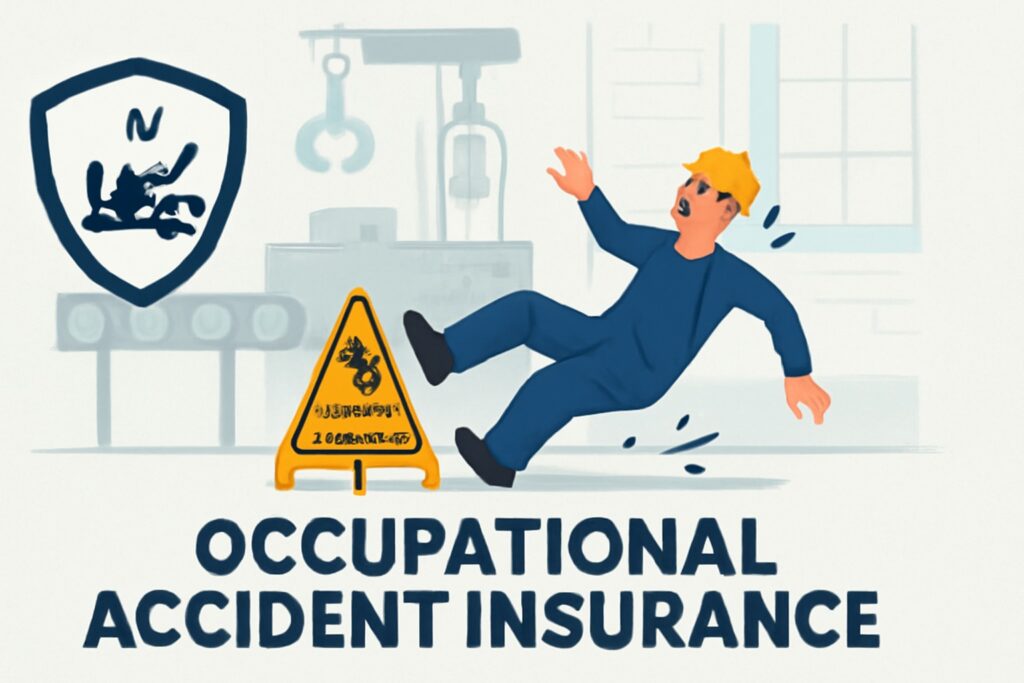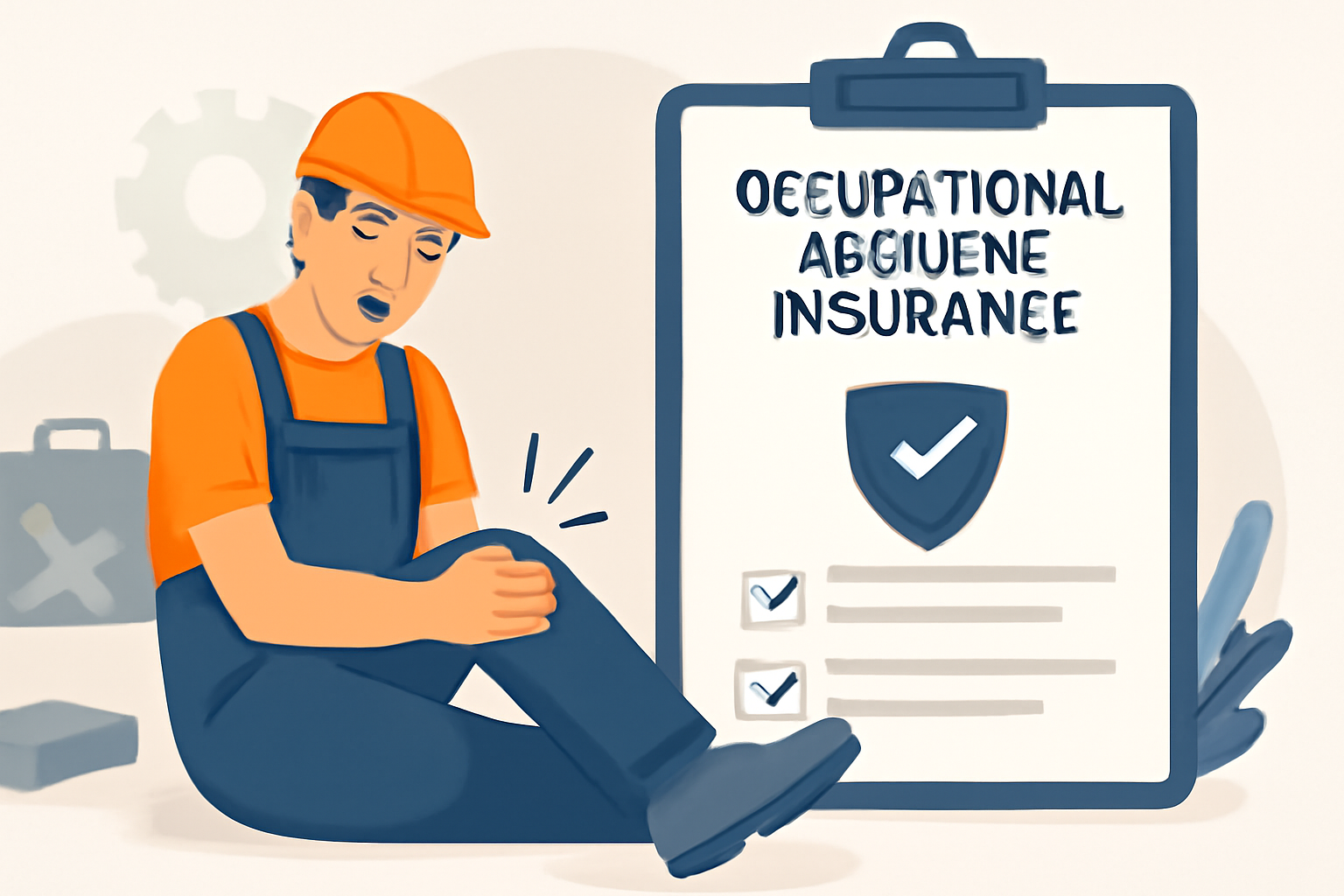Occupational accident insurance is a type of insurance coverage designed to protect employees and independent contractors who suffer injuries or fatalities as a result of job-related accidents. Unlike workers’ compensation, which is mandatory in many regions, occupational accident insurance is often a voluntary or supplemental option that provides customizable benefits.
This insurance is particularly relevant for industries with higher physical risk, such as construction, manufacturing, logistics, and gig economy jobs like delivery or rideshare driving. It helps cover the medical costs, lost wages, and other financial burdens that result from on-the-job accidents.

Why Occupational Accident Insurance Matters
Occupational accident insurance plays a critical role in bridging the gap between employee well-being and employer responsibility. Here are the main reasons it matters:
- Financial Protection: Injuries at work can lead to high medical bills and income loss. This insurance cushions those financial blows.
- Flexible Coverage: Unlike standard workers’ comp policies, occupational accident insurance can be tailored to meet specific needs, offering flexibility in benefit limits and coverage options.
- Appeals to Independent Contractors: As many gig workers and freelancers are not covered by workers’ compensation, occupational accident insurance offers essential protection in case of workplace injuries.
Key Features of Occupational Accident Insurance
Understanding the components of occupational accident insurance helps both employers and workers evaluate its value and necessity. The following are core elements typically included in such a policy:
Medical Expense Coverage
This covers the cost of treatment following a workplace injury, including hospitalization, surgery, doctor visits, prescription medications, and rehabilitation. Most policies have a limit on the total medical expenses covered per incident or per policy term.
Disability Income Benefits
Occupational accident insurance often includes short-term and long-term disability benefits. These provide a percentage of the worker’s income during periods when they’re unable to perform their job duties due to injury.
Accidental Death and Dismemberment (AD&D)
If an employee dies or suffers a severe injury such as the loss of a limb or eyesight due to a workplace accident, the insurance offers a lump-sum benefit to the worker or their beneficiary.
Survivor Benefits
In the unfortunate event of a fatal accident, occupational accident insurance may also provide survivor benefits to the family members or dependents of the deceased worker.
Occupational Accident Insurance vs. Workers’ Compensation
While they may seem similar, occupational accident insurance and workers’ compensation serve different purposes and come with different legal and financial implications.
Coverage Requirements
Workers’ compensation is legally mandated in many jurisdictions for businesses with employees. In contrast, occupational accident insurance is generally optional and most commonly used to provide coverage for independent contractors or as supplemental insurance.
Flexibility and Customization
Occupational accident insurance allows for more flexibility in policy terms and benefit amounts. Employers can choose the extent of coverage based on budget and workforce needs.
Legal Liability
One key difference is legal protection. Workers’ compensation usually protects employers from being sued by injured employees. Occupational accident insurance, however, may not offer the same level of legal immunity, which means companies may still face liability claims unless they supplement coverage with employer’s liability insurance.
Who Should Consider Occupational Accident Insurance?
Employers with Independent Contractors
Companies that rely heavily on freelancers, gig workers, or contract labor should consider occupational accident insurance as a vital safety net. It helps reduce risk exposure and shows a commitment to worker welfare.
Small Businesses Without Workers’ Compensation
In regions where workers’ compensation isn’t mandatory for small businesses, occupational accident insurance offers an affordable alternative to cover work-related injuries and deaths.
High-Risk Industry Employers
Industries such as trucking, construction, oil and gas, and field services that carry a higher risk of physical injury should explore occupational accident insurance to mitigate financial and reputational risks.
Benefits of Occupational Accident Insurance
Cost-Effective Protection
For businesses, especially small and medium-sized enterprises, occupational accident insurance offers a cost-effective solution compared to comprehensive workers’ compensation programs. Premiums can be adjusted based on coverage limits and workforce size.
Peace of Mind for Workers
Knowing that they’re covered in the event of an accident increases job satisfaction and reduces anxiety for workers, especially those not covered by conventional insurance schemes.
Business Continuity
By reducing the financial disruption caused by workplace injuries, businesses can maintain operational continuity and avoid costly litigation or absenteeism.
Final Thoughts on Occupational Accident Insurance
Occupational accident insurance is an essential tool for protecting workers and businesses from the financial consequences of job-related accidents. While it does not replace the comprehensive nature of workers’ compensation, it provides meaningful benefits, especially in scenarios where workers’ comp is not applicable or available. By understanding the scope and purpose of occupational accident insurance, employers and workers alike can make informed decisions to safeguard health, income, and workplace well-being.
